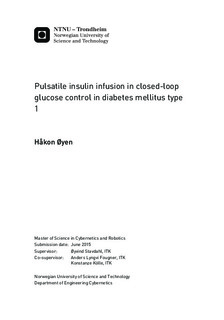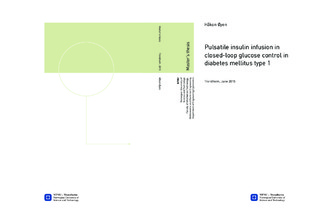| dc.description.abstract | Diabetes is a chronic decease which affect the body's ability to regulate the blood glucose level(BGL). Not being able to maintain a steady BGL can lead to many severe complications. There is done much effort in order to develop a artificial pancreas. In healthy humans the BGL is regulated mainly trough insulin, which is secreted in pulses by the beta cells. This is believed to have greater hypoglycemic effect than normal continuous infusion. In this thesis a method for controlling the BGL by pulsatile infusion, both with intravenously and intraperitoneal approach was described. The pulsatile infusion showed good performance in closed loop simulations. However the effect of giving insulin in a pulsatile manner was little, giving no oscillation in BGL. In order to draw further conclusions about the controller, this effect must be included into the model.
An recursive least square scheme was implemented in order to test the possibility for adaptive control. Both the pulsatile and the normal controller gave about equal performance regarding online parameter estimation. When there was small fluctuations present, the online estimation worked in both case. Therefore it is likely that pulsatile control is more suitable for adaptive control because of the possibility for oscillations in BGL. In addition a model extension for physical activity is included into the glucose insulin model. | |

